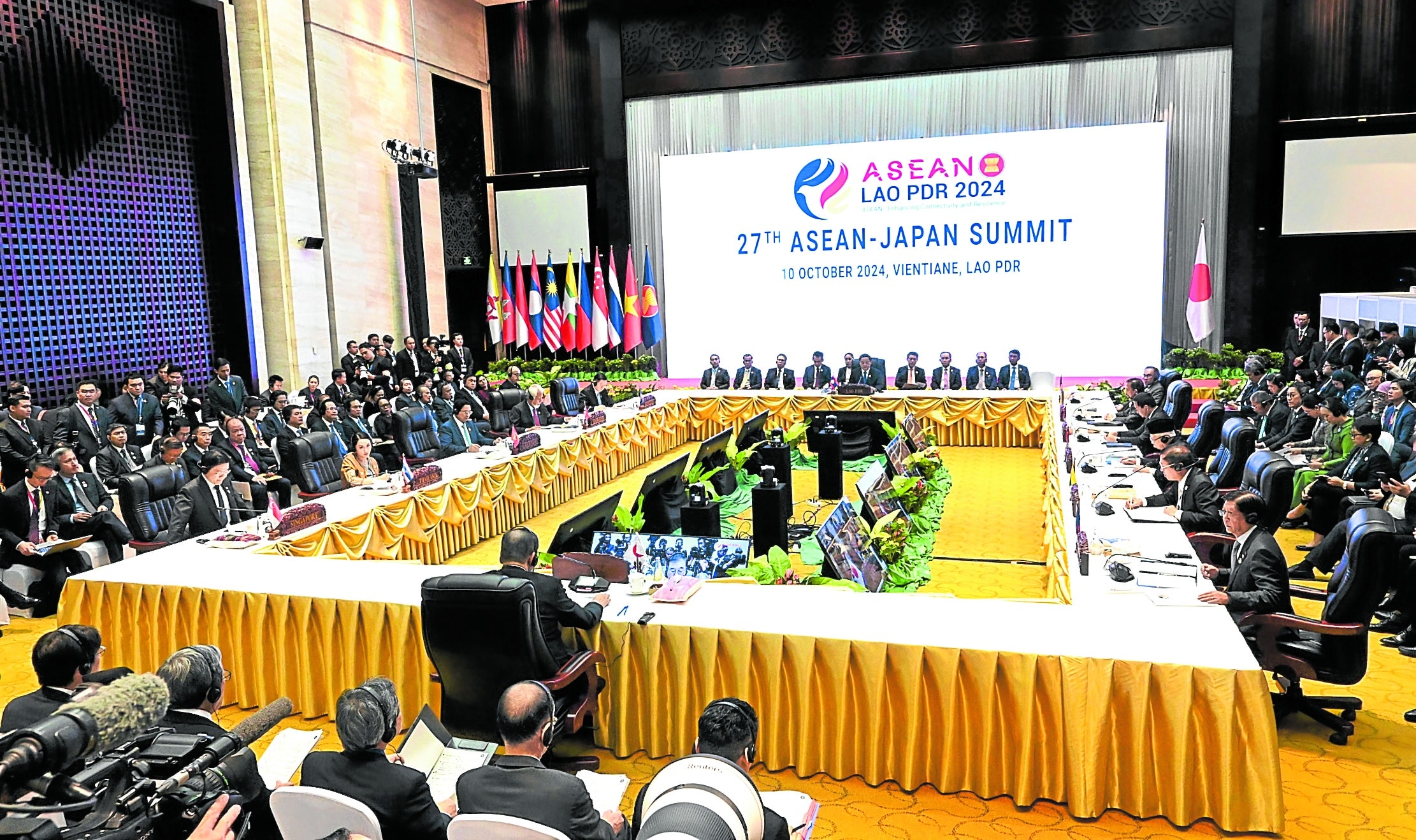
ASEAN MEETS WITH JAPAN, CHINA Leaders of the Association of Southeast Asian Nations (Asean) also hold a meeting with Japan (above) and with China on Thursday. President Marcos has again used the Asean platform to call out Chinese aggression in the West Philippine Sea. —PPA Pool photo
VIENTIANE, Laos — President Ferdinand Marcos Jr. urged the 10-member Association of Southeast Asian Nations (Asean) at a closed-door session “not to turn a blind eye” to aggressors in the South China Sea, as its silence “diminishes” the regional bloc, according to a copy of his speech seen by Philippine media here.
“We call on all Asean member states not to turn a blind eye to the aggressive, coercive, and illegal actions of an external power against an Asean member state,” the text of the President’s speech read in part.
“They run counter to one of Asean’s purposes: to unite the region as a bulwark against external threats and conflicts, and ensure that each Asean member state can lead its national existence free from interference, subversion, and coercion. Silence in the face of these violations diminishes Asean,” it added.
READ: West Philippine Sea on Marcos agenda at Laos summit
Marcos was said to have delivered the speech using unusually strong language during his intervention at the 44th and 45th Asean retreat summit attended by fellow Asean heads of state and world leaders in the Laotian capital, on Wednesday.
‘Improper’ to disclose
Asked on Thursday to confirm whether he made the statements verbatim, Marcos said it was “improper for him to disclose what was discussed during the closed-door meeting.”
A copy of the speech was shown to reporters, including the Inquirer, by a member of the Philippine delegation.
The speech did not name but alluded to China and its recent series of attacks and harassment, using water cannons and lasers, on Philippine coast guards and sailors on resupply missions to the West Philippine Sea, the term Manila uses for the waters within its 370-kilometer exclusive economic zone (EEZ) in the South China Sea.
Also on Thursday, Marcos urged Asean states to fast-track the long-overdue code of conduct (COC) for resolving maritime conflict in the contested waters.
At the 27th Asean-China Summit attended by Chinese Prime Minister Li Qiang, Marcos called for “more urgency in the pace of the negotiations,” noting that the Philippines was being “subjected to harassment and intimidation” by China, which claims nearly all of the sea.
Based on old maps
The Philippine leader also stood firm that China’s aggression and intimidation “demonstrates the continued disregard of international law and standards.”
“Such behavior is not unnoticed by our respective publics and the international community as well. That they will require a concerted and urgent effort to adopt measures to prevent their recurrence,” he said, adding: “Parties must be earnestly open to seriously managing the differences and to reduce tensions.”
Based on its old maps, China claims sovereignty over almost the entire South China Sea and has deployed a fleet of coast guards deep into Southeast Asia, including the EEZs of Malaysia, Brunei, the Philippines, and Vietnam.
The idea of a maritime code was first agreed between China and Asean in 2002 but the formal process of creating one did not start until 2017.
Progress has since been painstakingly slow, with years spent discussing the framework and modalities for negotiations and guidelines issued to try to speed it up. Some Asean members are concerned the COC will not be legally binding.
Marcos voiced frustration that parties involved could not agree on many things, adding “the definition of a concept as basic as ‘self-restraint’ does not yet enjoy consensus.”
“It is time that we tackle these milestone issues directly so we can make substantive progress moving forward,” he said.
Deeper economic ties
During his speech, Li, the Chinese prime minister who represented Chinese President Xi Jinping, did not mention the maritime tensions and instead called for deeper economic ties with the bloc, which has a market of 672 million people.
“Strengthening the market connection is an important direction for our further cooperation,” he said, adding: “I believe that the closer and more organic integration of the two major markets of China and the Eastern China Sea will contribute to the economic development of both China and Asean countries.”
The Asean leaders held separate meetings with Japan’s new Prime Minister Shigeru Ishiba and South Korean President Yoon Suk-Yeol ahead of the Asean Plus Three Summit, which also includes China.
The bloc will also engage in individual discussions with dialogue partners such as Australia, Canada, India, the United States, and the United Nations, culminating in the East Asia Summit on Friday.
Marcos has confirmed bilateral meetings with India, Japan, and Canada so far before his scheduled return to the Philippines on Friday.